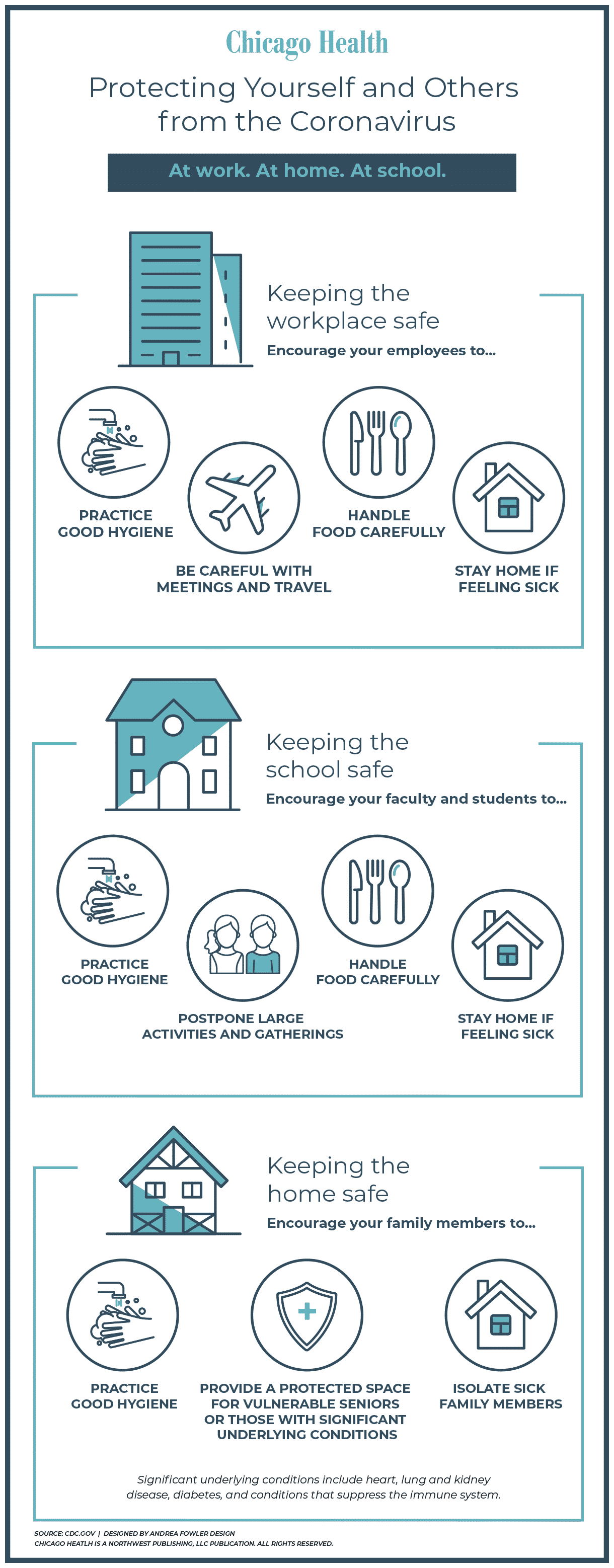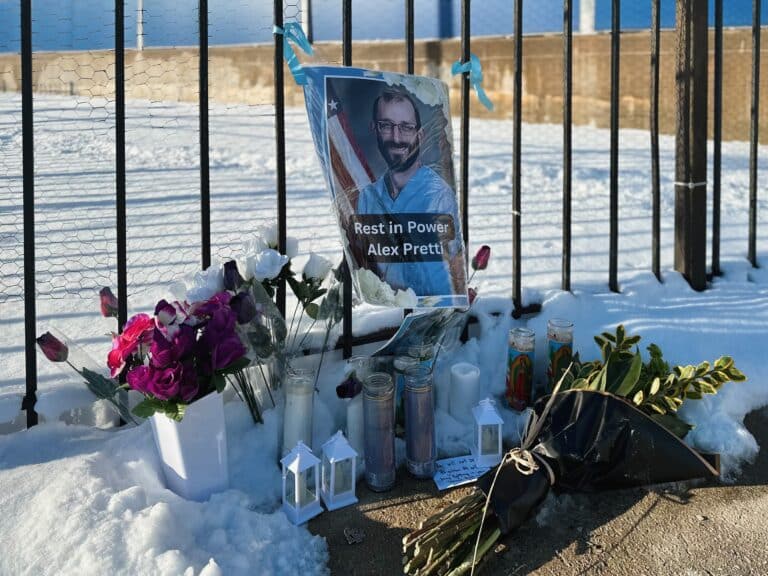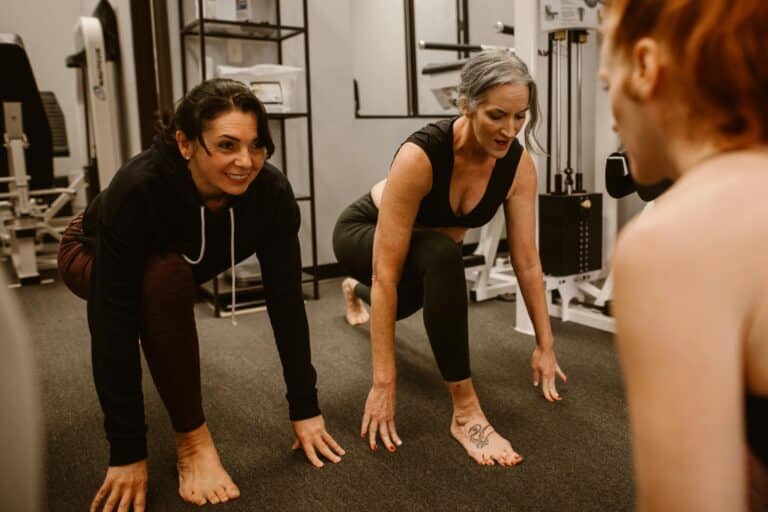As Illinois ramps up testing for the new coronavirus, anxiety is ramping up right along with it. People over age 60 and those with certain chronic medical conditions, such as heart disease, diabetes and lung disease, are at higher risk of getting seriously sick from COVID-19 — and cases are on the rise in Illinois.
Even if a case of COVID-19 likely wouldn’t take a great toll on your health, it’s important to avoid passing it on to other people — who could become critically ill.
The World Health Organization (WHO) declared the coronavirus a pandemic on March 11, with 114 countries reporting cases. In a media briefing two days earlier, WHO Director-General Tedros Adhanom Ghebreyesus said, “Now that the virus has a foothold in so many countries, the threat of a pandemic has become very real. But it would be the first pandemic in history that could be controlled. The bottom line is: We are not at the mercy of this virus.”
Lincoln Square resident Allison (who asked that her last name be kept private) works at a technology company in downtown Chicago and recently developed cold and flulike symptoms. While she hasn’t sought coronavirus testing, she has stayed home from work. “I don’t want to spread it to my parents or other people who might be more susceptible to it. Luckily, I’m able to work from home, so I’ve been doing that probably more proactively than I normally would if I had a cold,” she says.
In Chicago’s Mayfair neighborhood, resident Lynn Gilbertsen is keeping an eye on government recommendations. The high school English teacher and mother of two young children says, “I’m definitely not in a panic mode about it, but I do think people need to take the spread of disease seriously.”
In her classes at Oak Park and River Forest High School, Gilbertsen talks frankly with worried students. She encourages them to find balance between what they’re hearing in the media and steps they can take to feel in control in their own lives. “When you have worry, what can you do? Wash your hands more. Wash your hands the right way,” Gilbertsen says.
Here are steps the Centers for Disease Control and Prevention currently recommends taking in various situations — at home, at work, at school, in the community — to reduce your risk of infection and keep others safe, too.
Home:
- Plan how you would care for family and friends at higher risk for serious complications. Check in with them regularly.
- Get to know your neighbors and the aid organizations in your community.
- Make a list of emergency contacts.
- Avoid close contact with people who are sick.
- Stay home when you’re sick, except to get medical care. That may mean asking for help to get groceries or other necessities, or having them delivered via online services.
- Cover your coughs and sneezes with a tissue — and then wash your hands.
- Clean frequently touched surfaces and objects every day, including tables, countertops, light switches, doorknobs and cabinet handles.
- Wash your hands for at least 20 seconds after you use the bathroom, before you eat and when you return home.
- Increase ventilation by opening windows or adjusting air vents.
- Clean utensils frequently.
- Identify a room in your home to separate sick household members.
School:
- Avoid close contact with people who are sick.
- Nod or tap elbows as a greeting.
- Increase ventilation by opening windows or adjusting air vents.
- Postpone gatherings or meetings.
- Hold classes outdoors or in well-ventilated spaces when possible.
- Don’t share food.
- Cover your cough or sneeze with a tissue. Throw the tissue in the trash, and wash your hands.
- Wash your hands for at least 20 seconds after you use the bathroom and before you eat.
- Stay home if you or your child is sick with any illness.
- Be prepared if your school or childcare facility is temporarily dismissed.
- Talk to your school about digital and distance learning.
- Discourage gathering in public places if school is dismissed to help slow the spread of COVID-19 in the community.
Work:
- Actively encourage sick employees to stay home.
- Stop handshaking. Try a nod or elbow bump instead.
- Wash your hands upon arrival, and schedule reminders to periodically wash your hands.
- Increase ventilation. Open windows, doors and adjust air vents.
- Avoid sharing food.
- Promote respiratory etiquette and hand hygiene.
- Clean all frequently touched surfaces — workstations, countertops and doorknobs.
- Use disposable cleaning wipes to wipe down commonly touched surfaces (doorknobs, keyboards, remote controls, desks) before each use.
- If traveling for work, check the CDC’s Traveler’s Health Notices for guidance and recommendations.
- Check yourself for symptoms of acute respiratory illness before travel. Notify your supervisor, and stay home if you’re sick.
- If you become sick while traveling, notify your boss and call a healthcare provider for advice, if needed.
- If outside the U.S., follow your company’s policy for obtaining medical care or contact a healthcare provider to assist with finding an appropriate healthcare provider in that country. A U.S. consular officer can help locate healthcare services.
For the latest information on the new coronavirus and ways to prevent the spread of COVID-19, check for updates from the following organizations:
- Chicago Department of Public Health (CDPH)
- Illinois Department of Public Health (IDPH)
- Centers for Disease Control and Prevention (CDC)
- World Health Organization (WHO)


An award-winning journalist, Katie has written for Chicago Health since 2016 and currently serves as Editor-in-Chief.










